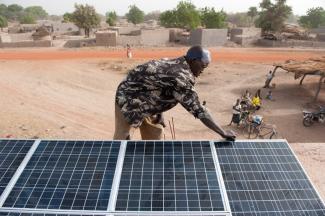OECD Peer Review
Don’t neglect the poorest

In 2014, the Federal Government spent more than the equivalent of $ 16 billion on ODA – 12 % more than in the previous year. Annual increases are planned until 2019. This is a success according to the latest peer review of the Organisation for Economic Co-operation and Development (OECD). Every five years, the OECD’s Development Assistance Committee (DAC) evaluates the effectiveness of the development aid of its mostly prosperous member countries.
Germany is currently the fourth biggest economy in the world, as the authors write. It has taken the lead in the Euro zone in promoting international development. In late 2014 Chancellor Angela Merkel and Development Minister Gerd Müller launched the Charter for the Future, which is an important contribution to the UN’s 2030 Agenda for sustainability, according to the OECD.
The authors appreciate that Germany is at the forefront of climate protection. The issue is at the core of domestic initiatives as well as ODA policies. For instance, the Federal Government spends 28 % of its ODA-budget on climate protection compared with an average 16 % for all DAC-countries. But the peer review also identifies room for improvement. The Charter for the Future’s agenda is too broad and lacks clear priorities, it states. The authors suggest Germany should adopt an operational framework to implement it.
Furthermore, the authors note discrepancies between Germany’s official criteria for allocating ODA-funds and its political commitment to focus on fragile states. The problem is that good governance is a precondition for German ODA, but fragile states typically cannot deliver such governance. Accordingly, the OECD argues that Germany should reconsider the allocation criteria.
The reviewers applaud the fact that German ODA spending has risen to $ 16.3 billion, but they are uncomfortable with how the money is spent. Emerging markets received the most German ODA-funds in 2012 and 2013. The top-recipient was China with almost $ 700 million followed by India with about $ 600 million. Only 27 % of ODA-money went to the least developed countries (LDCs), which, as the OECD report notes, contradicts Germany’s political pledge to focus strongly on support for LDCs. The OECD recommends that Germany should channel 0.2 % of gross national income (GNI) to LDCs until 2030. Furthermore, the UN target for all DAC-member is to allocate 0.7 percent of GNI to ODA, and the OECD experts propose that Germany should set a timeframe for achieving that share.
Findings of the review indicate that the merger of three technical-cooperation agencies into GIZ has borne fruit, with instruments now delivering better results. Likewise, reforms are said to have made the work of the German development bank KfW more efficient. However, the experts want the bank to decentralise operations and give its country offices more say.
The Federal Ministry for Economic Cooperation and Development (BMZ) has started to post more of its staff in embassies. This is a positive step according to the OECD authors, as embassy-postings form a link between GIZ-programmes and projects of non-state actors. However, decision-making within the BMZ is still slow and the ministry seems unable to speed up the flow of information between itself, other ministries and ODA implementing agencies.
The BMZ appreciates the activities of German civil society. Non-Governmental Organisations (NGOs) receive about eight percent of ODA funding. The money mainly goes to party-political foundations and church-based organisations. Engagement Global is commissioned to support all other NGO projects, but transaction costs are high, according to the OECD. To reduce costs, the authors propose to increasingly finance long-term projects.
Despite various points of criticism, the OECD acknowledges that Germany has fully implemented almost 40 % of the recommendations made in the peer review five years ago, and the remaining 60 % have been implemented at least partially. Hence, the authors assume that the Federal Government will take the new report seriously too.
Theresa Krinninger
Link:
DAC peer review 2015:
http://www.oecd.org/development/peer-review-germany.htm









